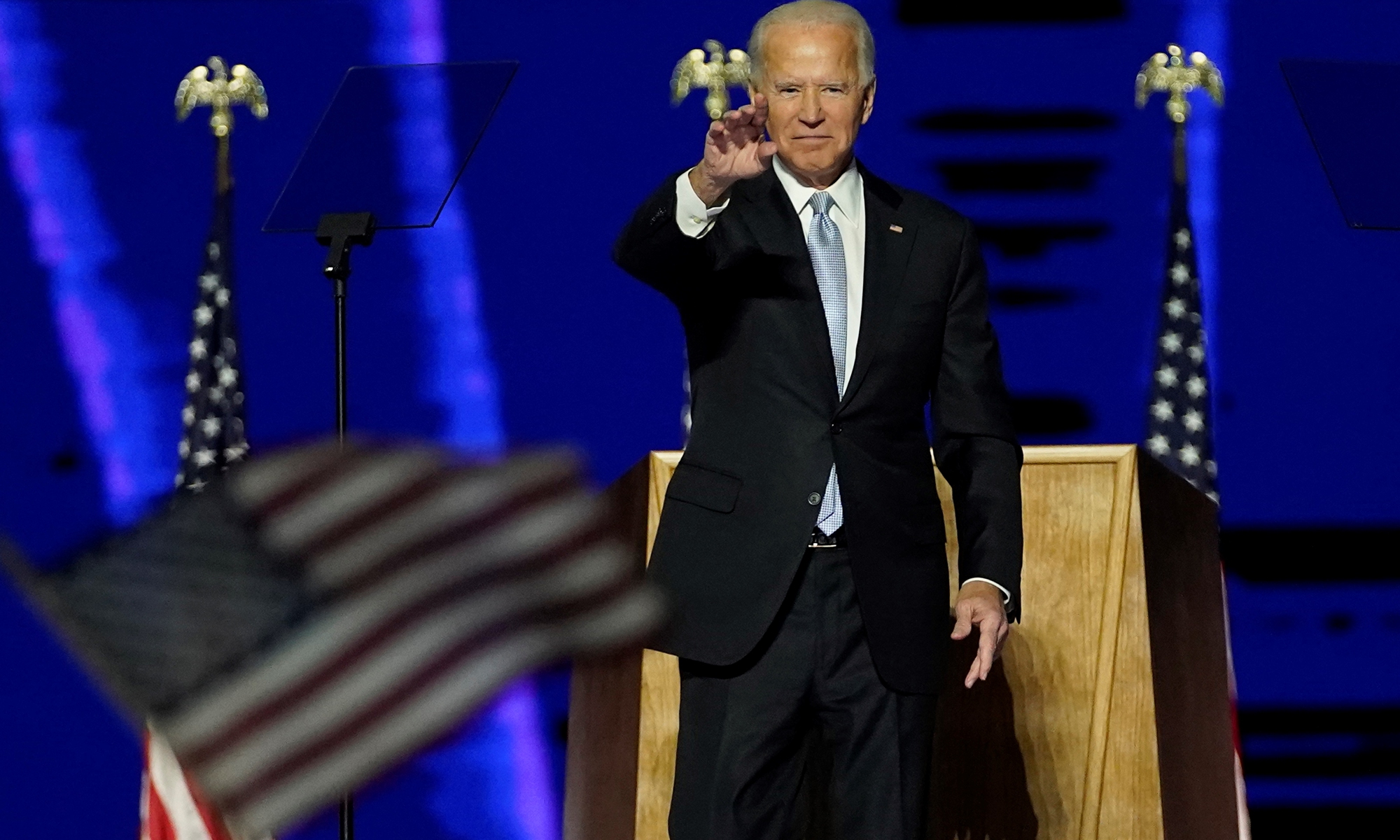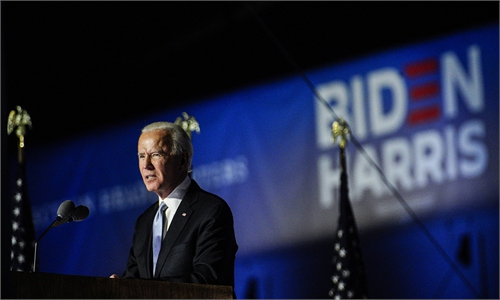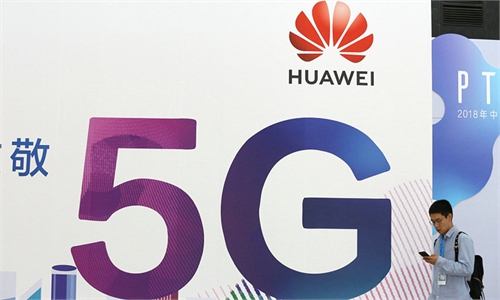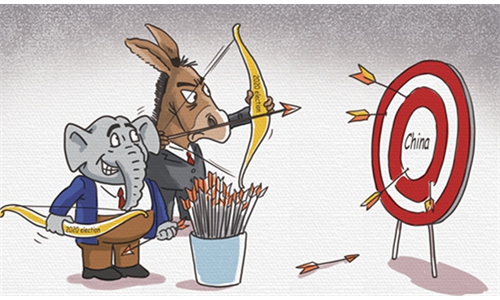Biden to affect China’s ties with EU; 'but not to worry'
US acts in S.China Sea are futile, as long as China remains friendly with regional countries

US president-elect Joe Biden delivers remarks in Wilmington, Delaware, on Saturday, after being declared the winner of the US presidential election. Photo: AFP
After Joe Biden announced his victory in the US presidential election, many leaders of the major powers around the globe have sent their congratulations including leaders of the EU and India. Chinese experts believe that the change that Biden may bring to international relations will surely impact China's ties with others, but there is "no need to be worried."
For the European Union (EU), most countries are expecting Biden to fix the damages that Donald Trump has caused to the transatlantic alliance, and Biden will keep challenging China's sovereignty in the South China Sea and using India to contain China, but to what extent that could bring challenges to China depends on China's own patience and diplomacy, and in some areas, Biden might bring some changes that favor China's interests, Chinese analysts said on Monday.
"Welcome back America!" is the headline used by many US media for the reports about world leaders' congratulations to Biden's victory. According to CNBC's report, German Chancellor Angela Merkel said she was looking forward to working with Biden and said the transatlantic relationship is "irreplaceable."
French President Emmanuel Macron wrote in a tweet that "The Americans have chosen their President. We have a lot to do to overcome today's challenges. Let's work together!"
Cui Hongjian, director of the Department of European Studies of the China Institute of International Studies, told the Global Times on Monday, "These reactions don't necessarily mean how much they love Biden, but reflect that the EU members can't stand the Trump administration anymore."
But what could Biden do to fix the transatlantic ties remains to be seen, and the EU members are actually holding cautious optimism, Cui noted.
Lü Xiang, a research fellow on US studies at the Chinese Academy of Social Sciences in Beijing, said that after Biden formally takes office, the question will not be whether the US has any new demands on the EU, but to what extent "the US could make changes or compromises to satisfy the EU's demands."
With an increasingly conservative US society, which was obvious in the votes during the US election, the new US administration will find it very difficult to make full adjustments to cancel all the policies adopted during the Trump term, Lü told the Global Times on Monday.
Jin Canrong, associate dean of the School of International Studies at the Renmin University of China in Beijing, told the Global Times on Monday that "the recovery of US-EU ties has no contradiction with the development of China-EU relations. China welcomes a stable US-EU relationship. But if the US and the EU reach common ground to contain China, China will surely retaliate."
So what impact the new US administration could have on the China-EU ties depends on the composure and independent policymaking of the EU leaders, Jin said.
Good news, bad news
According to the Xinhua News Agency, Chinese President Xi Jinping said Wednesday via video at the opening ceremony of the third China International Import Expo that China will speed up negotiations on a China-EU investment treaty.
Cui said the China-EU investment treaty is largely impacted by the phase two China-US trade deal as they cover similar issues like subsidies to state-owned enterprises, so the EU will wait and see what the Biden administration would do to fix US-EU trade ties and what changes will take place in the US-China trade relations.
Apparently, Biden's victory will bring the EU more leverage, Cui noted. "In the past, the unilateralism and protectionism embraced by the Trump administration left the EU with limited space to bargain. After Biden formally becomes president, the EU can use the conditions and compromises it gets from both the US and China to serve its interests in this triangle game."
Biden and his Democrats will have more common ground with the Western mainstream values and political ideologies, so they will be more united than in the past, and the pressure on China would increase, Cui further said.
But on the other hand, Biden will also make positive changes in the fields of trade and economy. For instance, without the pressure from the Trump administration to ruthlessly urge European countries to ban cooperation with Chinese companies, like Huawei on the 5G network, the China-EU cooperation in high-tech and infrastructure areas will be easier and smoother, said analysts.
Jin said that this would be a positive change, and those conservative forces in the EU who want to use Trump's decoupling attempt with China to push for China-EU decoupling will fail after Trump loses power, and "we hope the EU leaders can maintain independence in policy-making and make decisions based on the EU's own interests when cooperating with China."
The UK, which has received huge pressure from the US on the Huawei issue, could consider making some adjustment on its announced policy, and the door of further talks is always open on the side of China, said Lü.
"Expecting the Biden administration to cancel all Trump-made policies is not very realistic, so it remains unclear whether or not Biden will remove Trump's demands for US allies to ban Huawei. Before handling China-related issues, Biden and his EU counterparts should work on the issues between them first, like tariffs on Germany-made automobile imports," Cui said.
On other issues like the WTO reform, fighting COVID-19 under the framework of the World Health Organization (WHO) and climate change, China, the EU and the US will restart cooperation and negotiation, as these are all challenges that these major powers should cooperate to overcome, said Chinese experts.
But since the US has formally withdrawn from the Paris Agreement and has declared its decision to withdraw from the WHO, China and the EU might ask the US to take concrete actions to fix these damages, Cui noted.
'Indo-Pacific' and South China Sea
Apart from Europe, the power transition of the US could also bring changes to the geopolitics in regions around China, and Chinese experts believe that Biden will change the name of the "Indo-Pacific sStrategy" as this is an idea put forth by the Trump administration, but the nature of the US strategy to use its partners and allies in Asia to contain China won't change too much.
In a pair of tweets posted on Sunday, Indian Prime Minister Narendra Modi also congratulated Biden and Harris. "I am confident that the vibrant India-US ties will get even stronger with your support and leadership," Modi wrote.
Jin said the US and India are becoming semi-allies during Trump's term and a series of documents have been signed, and this is unlikely to change.
The US wants India to buy more weapons and draw China's attention to the west, and India wants the US to pressure China from the east so it can expect compromise from China on the border issue, "so in fact, Washington and New Delhi just want to use each other, and in a real fight, there is no legally binding treaty that can require them to fight for each other, and they don't want such legally binding ties at all as they are all afraid of a war with China," Lü said.
In the South China Sea, the US will continue its stance to challenge China's sovereignty claims over the relevant islands and reefs, and the actions of sending vessels and military aircraft to execute the so-called freedom of navigation will continue, said Jin.
Biden might return to the approach used by the Obama administration - using countries in the region, like the Philippines and Vietnam, to pressure China, but to what extent he can succeed depends on China's ties with the ASEAN members in the region, Jin noted.
Lü echoed the view, noting that as long as China doesn't bully and threaten these regional countries and continues negotiation on sovereignty disputes, and keeps strengthening pragmatic cooperation and economic assistance, the US has no resources to upend their ties with China, the regional countries will not be fooled and used by Washington easily.




